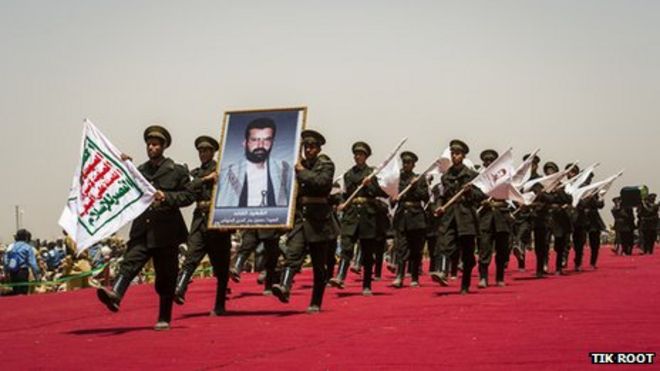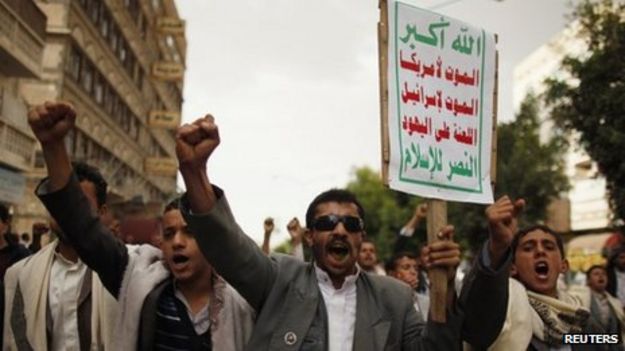Yemen’s Houthi rebels defy years of war and repression

Holding up “Death to America” signs and pictures of their fallen leader, an eager throng of Houthi rebels and their supporters gathered in the war-torn northern Yemeni city of Saada earlier this month for a funeral nine years in the making.
Just hours before the ceremony was set to begin, no-one had been told precisely where it would be held.
Despite being forced to hang around in the whipping dust, fidgety funeral-goers seemed understanding of the extra security.
They had, after all, come to bury Hussein Badr al-Dine al-Houthi, the charismatic founder of a group that has variously been a target for al-Qaeda, neighbouring tribesmen, and the central government.
When word came at 08:00, Houthi forces sprang into action. In less than three hours they funnelled hundreds of thousands of citizens, politicians and media past security checkpoints to a barren plot of land on the outskirts of the provincial capital.
An atmosphere somewhere between state funeral and political rally pervaded the crowd, which was flanked by 6m (20ft) tall portraits of the “martyred leader”.
Houthi was killed in 2004 during the first of six devastating wars between the group and the Yemeni government, but authorities refused to return his body until late 2012. A mass funeral is exactly what they had been hoping to prevent.
“They thought that people would forget Hussein al-Houthi because there was no body,” said Ali Imad, a young Houthi political leader, pointing out the irony of the miscalculation. “Imagine if we buried him nine years ago. Maybe 100 people would have attended.”
Instead, Abd al-Malik al-Houthi, Hussein’s brother and successor, presided over one of the most prominent Houthi gatherings ever.
In a rare public appearance he led the funeral prayer as well as thanked participants from across Yemen for attending.
‘Leadership personality’
The highly choreographed ceremony – complete with a sombre funeral procession – took place against a backdrop of shelled-out buildings that still dot the Saada landscape and serve as testament to the group’s tumultuous relationship with the government.
The Houthi movement is rooted in the Zaydi interpretation of Islam, considered a moderate offshoot Shia sect.
In the 1990s disciples of Hussein al-Houthi’s father, and other respected religious scholars, formed a Zaydi revivalist group known as The Believing Youth.
Hussein, busy as an MP and then a student in Sudan, was not as directly involved as some but, upon returning to Saada, he began explicitly linking Zaydi teachings to politics.
Giving sermons at mosques, schools and houses across the province in the early 2000s, the clean-cut and captivating Hussein used his anti-American rhetoric to galvanise support.
“Hussein al-Houthi had a leadership personality. Everyone that knew him loved him,” reminisced Abdulkareem Jadban, an MP from Saada and old friend of Houthi. “He urged people to the face the American hegemony after 9/11.”
Houthi’s lecturing quickly drew the ire of former President Ali Abdullah Saleh, who was, at the time, establishing himself as a fickle yet open alley of the United States and domestically focused on suppressing perceived challenges to his rule.
By 2004, tensions boiled over. Houthi and government forces engaged in three months of armed conflict which ended with Hussein’s death.
Nearly a decade of fighting ensued, during which it is thought that thousands were killed and at least 314,000 displaced.
Only the onset of the Arab Spring in Yemen stemmed the rounds of conflict with the government, which may very well have continued.
Growing support
The Houthis were among the first to join the uprisings. In a way, it was a battle they had been involved in for years.
“They were one of the first predecessors of the Arab Spring. They were anti-Saleh, they were anti-repression,” said Madeleine Wells, a PhD student at George Washington University and author of a comprehensive Rand report on the Houthi conflict.
Also known as Ansar Allah (Supporters of God), the Houthis have seen their standing rise dramatically during the transition period.

Their support base has broadened; their slogan – Death to America! Death to Israel! Curse the Jews! Victory to Islam! – can be seen plastered throughout the country; and they were able to orchestrate Hussein’s burial in the once-blockaded province. The latter was a show of force that even their adversaries acknowledge.
“It wasn’t a funeral, in reality it was a gathering meant to express power,” said Omar Mujali, a tribal figure from Saada who fled with his brother after their property was sacked by Houthis in retaliation for the family allegedly facilitating government attacks.
Mr Mujali believes that the Houthis’ recent gains have been a result of coercion, including at the funeral.
“They forced students from the schools to go in the thousands,” he claims.
As well as prompting this type of accusation – the likes of which Houthis have been denying for years – the funeral also left deeper questions about the future of the movement unanswered.
“It is organisationally impressive, but I am not sure it says anything about their creed or their legitimacy as a political party,” said Madeleine Wells.
Indeed, how Ansar Allah translates its rising capabilities into lasting political clout and what their long-term goals are, remain vague – uncertainties that do little to assuage their opponents’ concerns.
For now though, the Houthis appear content with their narrative, at the heart of which remains Hussein – his prestige as high in death as in life.




“They were anti-Saleh, they were anti-repression …” —— from the article
Intolerance will not be tolerated!! Crazy bastards wanting freedom and shit … what’s wrong with them? Can’t they be happy just eating felafels and watching a few beheadings on the Saudi sports channel?
‘“Iran needs to recognize that the United States is not going to stand by while the r e g i o n is d e s t a b i l i z e d or while people engage in o v e r t w a r f a r e across lines — international boundaries — in o t h e r c o u n t r i e s,” – John Kerry
http://www.pbs.org/newshour/rundown/kerry-warns-iran/
Now I know why you call him “A haircut in search of a brain”…
Hey, we’re just democratizing some more folks.
How dare anyone try to intervene with the sweet, sweet, death of bringing in a democracy for the Central Banksters.
All praise Fiat